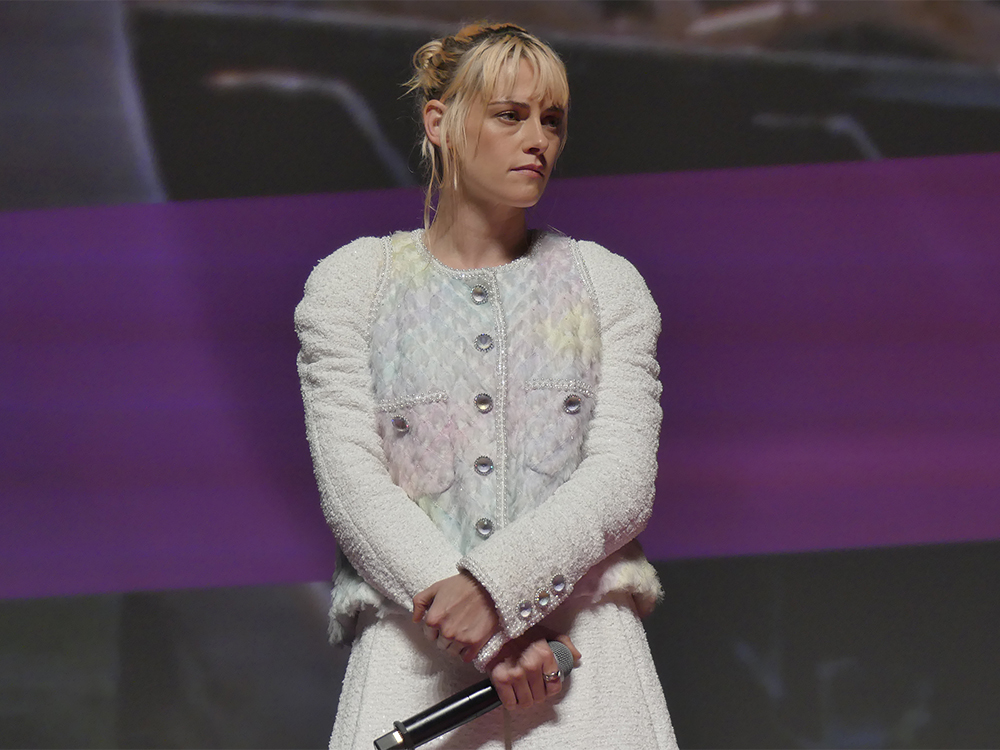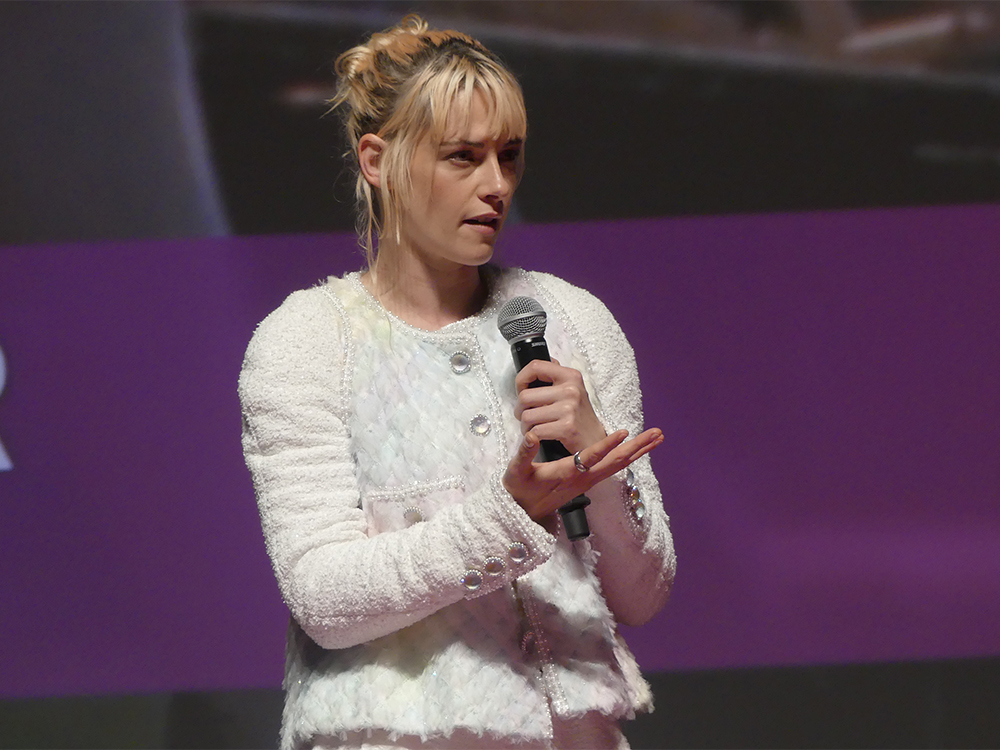Festivals - Deauville 2025: The Chronology of Water Q&A – Kristen Stewart dives into memory, trauma, and artistic rebirth
By Mulder, Deauville, Centre international de Deauville, 12 september 2025

On September 12, 2025, the Deauville International Center hosted a special preview screening of The Chronology of Water, the highly anticipated directorial debut of Kristen Stewart, who also co-wrote the screenplay. The event, attended by Kristen Stewart herself alongside producers Charles Gillibert and Maggie McLean, carried a charged sense of expectation. The air in the auditorium seemed to hum with curiosity — the transformation of a celebrated actress into a filmmaker adapting one of the most visceral literary memoirs of the last decade was no small feat. From the first frames, the film revealed itself as a sensory storm — intimate, fractured, and deeply human. It was not merely an adaptation of Lidia Yuknavitch’s autobiographical book, but an immersion into the physical and emotional topography of survival, art, and womanhood.
The Chronology of Water tells the story of a young woman, Lidia, who grows up in an environment poisoned by violence and alcoholism. She escapes her family, finds refuge in literature, and ultimately rediscovers herself through swimming and the written word. The narrative unfolds like a current — nonlinear, chaotic, alive — mirroring the rhythm of memory itself. As Lidia’s story shifts between pain and liberation, the film becomes less a biopic than an act of reclamation. Kristen Stewart and co-writer Andy Mingo strip away traditional narrative structure, choosing instead to let emotion dictate form. Each scene feels both raw and sculpted, each cut guided by the pulse of experience rather than chronology. Shot on 16mm film by cinematographer Corey C. Waters, its texture is tactile, breathing, almost wet. The celluloid grain reinforces the idea that memory, like water, is both elusive and impossible to contain.

At its heart lies a stunning performance by Imogen Poots, who embodies Lidia Yuknavitch from adolescence through adulthood. She doesn’t perform trauma — she inhabits it, carrying her character through years of pain, shame, and awakening with a quiet ferocity. Her physicality, her gaze, even her breathing seem connected to the film’s pulse. Around her, a strong ensemble gives depth and contrast: Thora Birch as a maternal presence, Earl Cave as a fragile counterpoint, Kim Gordon as an almost ghostly mentor, and Jim Belushi as the looming father figure. The film’s landscapes — shot between Latvia and Malta — oscillate between the cold austerity of the past and the shimmering expanse of the sea, as if geography itself becomes a mirror of the mind.
It took nearly eight years for Kristen Stewart to bring this film to life. She first encountered Lidia Yuknavitch’s memoir in 2017 and instantly recognized in it a mirror of her own artistic restlessness. What fascinated her was not just the story but the structure — a shattered, nonlinear narrative that refused to make trauma tidy. The director spent years rewriting, reshaping, and sculpting the screenplay into something that felt as neurological and ephemeral as memory itself. She often described her approach as a process of surrender — letting the story find its form rather than imposing one. Every frame bears that sense of discovery. The editing by Olivia Neergaard-Holm and the haunting score by Paris Hurley, supervised by Alexandra Eckhardt, fuse image and sound into something visceral, where emotion flows through rhythm more than dialogue.

From its earliest conception, The Chronology of Water was designed not as a polished narrative but as a confrontation — with shame, with silence, with the body. Kristen Stewart has spoken of the female experience as a “great secret,” something generations have been taught to hide. Her film seeks to unearth that secret, not through melodrama but through sensation. The sound design is immersive and physical, the editing sharp and rhythmic, creating an almost aquatic flow that pushes the audience to feel rather than simply observe. The film’s use of water — sometimes gentle, sometimes violent — reflects the dual nature of healing: purification and suffocation intertwined. The result is a cinematic experience that is as much felt as it is seen, where trauma becomes not an endpoint but a passage toward artistic rebirth.
The presence of producers Ridley Scott, Michael Pruss, Yulia Zayceva, and Charles Gillibert helped the project gain momentum after years of frustration. Financing came through Scott Free Productions, with a mix of international partners — a reminder that even personal art requires a network of belief. What stands out, though, is how fiercely personal this film remains despite its scale. Kristen Stewart’s artistic lineage — from working with Olivier Assayas on Personal Shopper to Pablo Larraín on Spencer — can be felt in her confidence with ambiguity and silence. Yet, The Chronology of Water feels entirely her own: a collage of memories, pain, and cinematic instinct shaped into something emotionally seismic.

The response from audiences has reflected that emotional charge. When it premiered at the 2025 Cannes Film Festival in the Un Certain Regard section, the film received a six-and-a-half-minute standing ovation. Critics described it as bold, divisive, but undeniably alive. By the time of its Deauville presentation, its reputation preceded it: a 93% approval rating on Rotten Tomatoes, a 76 on Metacritic, and numerous mentions as one of the year’s most daring debuts. The film’s reception in Deauville, followed by a thoughtful Q&A session, confirmed what Cannes had hinted at — that Kristen Stewart had made not just a film, but a declaration of intent.
During the discussion at Deauville, the audience seemed struck by the honesty of Kristen Stewart’s reflections. She spoke of the production’s challenges, of the years of waiting and rewriting, of learning to see direction as an act of listening rather than control. What she found in the process was a kind of artistic humility — a willingness to let imperfection speak. Her collaboration with Imogen Poots became central to that evolution; both women, at similar ages, found themselves revisiting parts of their own lives through the act of filmmaking. The director described the experience not as storytelling, but as an exchange of truth — a shared recognition that to tell one’s story is to reclaim power.

The upcoming French release, set for October 15, 2025, under Les Films du Losange, will extend the film’s life beyond the festival circuit. It will likely divide audiences — its fragmented structure and raw subject matter are not designed for comfort — but that is precisely what gives it weight. The Chronology of Water is not a film that seeks to please; it seeks to liberate. In doing so, it fulfills the promise that Kristen Stewart hinted at throughout her acting career: the instinct to find truth in discomfort, to confront rather than conceal.
You can discover our photos in our Flickr page
Synopsis :
Having grown up in an environment ravaged by violence and alcohol, young Lidia struggles to find her way in life. She manages to escape her family and enrolls in college, where she finds refuge in literature. Little by little, words offer her unexpected freedom...
The chronology of water
Directed by Kristen Stewart
Written by Kristen Stewart, Andy Mingo
Based on The Chronology of Water by Lidia Yuknavitch
Produced by Ridley Scott, Charles Gillibert, Yulia Zayceva, Max Pavlov, Svetlana Punte, Michael Pruss, Rebecca Feuer, Kristen Stewart, Maggie McLean, Dylan Meyer, Andy Mingo
Starring Imogen Poots, Thora Birch, Earl Cave, Kim Gordon, Jim Belushi
Cinematography : Corey C. Waters
Edited by Olivia Neergaard-Holm
Production companies : Scott Free Productions, Forma Pro Films, CG Cinéma, Nevermind Pictures, Fremantle, Curious Gremlin, Lorem Ipsum Entertainment, Scala Films
Distributed by Les Films du Losange (France)
Release date : May 16, 2025 (Cannes), October 15, 2025 (France)
Running time : 128 minutes
Photos and video : Boris Colletier / Mulderville

